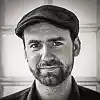Chong Kneas floating village, only 15 kilometers south of Siem Reap, is one of hundreds that line Tonle Sap Lake. Tens of thousands of families live in these clustered homes, around 40% of whom are Vietnamese living as undocumented migrants.
Editor's note: This photo essay was created before the pandemic. In June 2021, the Cambodian government started evicting floating communities from their home, citing security and pandemic concerns.
During a visit in March 2019, the sun held all firmly in its grip, forcing villagers inside. Rarely have so many people been so close to water yet so desperate to stay cool. Nonetheless, a small number paddled around in flat-bottomed sampans, rowboats or, for the more adventurous kids, plastic tubs.

The only way to access the village is by boat.
Many children were studying in the floating primary school or waiting outside for their parents to pick them up and boat them back home. Others played in the water as we passed, splashing around and calling out to us, evidently not too concerned about the pythons.

Kids play and swim to keep cool.
It was dry, searing-heat season, so the water level was far lower than just a few months before. During such times, the village relocates far out into the lake. In the rainy season, the nearby river is high enough for everyone to live along the more manageable stretches of Tonle Sap River.

Some villagers earn money by giving boat rides to tourists.
Yet these floating villages can be turbulent places to live, especially for Vietnamese. They live here as they are not allowed anything else: to live on land, buy property or even get a factory job. What's more, the settlements are technically illegal, making it difficult for those living here to avoid eviction if authorities choose to move them on, especially if they are not ethnically Cambodian.

A lady sells coffee and drinks in a scene reminiscent of Can Tho's floating market.
Thankfully, however, despite racial tension across the nation, Chong Kneas remains a peaceful medley of cultures, with Cambodian, Vietnamese and ethnic Cham Muslims living together, and often forming mixed marriages. In addition to the floating primary school, there is a market, temple and police station. There was once a floating basketball court as well.

A floating garden.
Som Borak, who grew up in the village and learned English from tourists, said there is "no problem living together. There's not Vietnam, Cambodia, Muslim separate. We all live together. Some people are moving to live on the land now. But for fishing, you are going to live on the water. Because living on the water is free for living."
Take a look at the village below:

A Vietnamese Buddhist temple in the village.

A Vietnamese family comes to visit the temple.

A raised platform for repairing boats.

A monkey, kept as a pet, tries to keep cool.

Ducks drink lake water to help cope with the heat.

Tiny shrimp drying in the sun.

Som Borak has lived in the village since he was born.
















